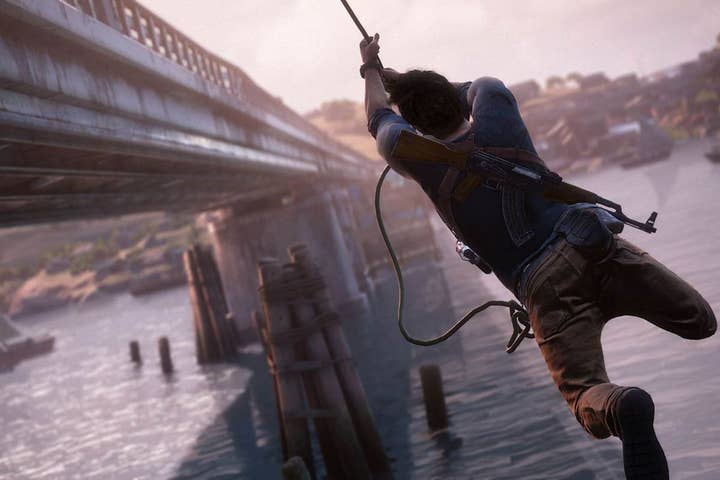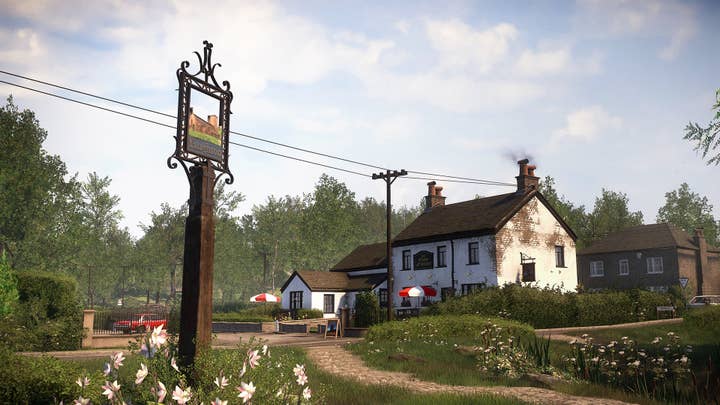Growing the industry with evening-sized games
Former Chinese Room lead Andrew Crawshaw on his romantic metal-detecting adventure that explores how people define success
"I can't commit to 80-hour games. It's like saying you want a pizza and someone coming up with a pizza the size of a tennis pitch."
That's Andrew Crawshaw's take on many of the AAA blockbusters vying for players' time, as he discusses how his own gaming tastes are shaping Thunkd, his new UK independent studio. Well, we say 'new' -- Crawshaw actually set it up in 2011, but he's been rather busy.
For six years, he was lead designer at acclaimed indie The Chinese Room, working on games such as Amnesia: A Machine For Pigs, So Let Us Melt and the BAFTA-winning Everybody's Gone To The Rapture.
Now he's branching out in an attempt to establish what he likes to call "evening-sized games," his solution to the bloat of those 80-hour epics. But what counts as an evening?

"I'm thinking two to four hours," he tells GamesIndustry.biz. "People play at their own pace, so that's not a hard metric.
"A lot of games are becoming increasingly time-hungry and I think that's bad for the industry because they literally want to eat up all your spare time, and that means you don't have time to look at other people's games or other experiences."
As AAA publishers have shifted towards open-world games, the sheer size of them can be daunting -- especially if you're primarily interested in the story. Often the narrative of a game that size can be stretched out over up to 100 hours with side quests, tangents and grinding.
Crawshaw also believes these games can become too dense mechanically, adding: "If you distract people with learning something new or there's too much action, they can lose sight of the story. And sticking too many mechanical things in there tends to destroy the pace."
He suggests the industry could take inspiration from the popularity of Let's Play videos, perhaps releasing a condensed narrative recap of blockbusters like Uncharted, almost like a TV show.
"A lot of games are becoming increasingly time-hungry and I think that's bad for the industry"
"Maybe throw in some graphical cheats, condense some of the combat sections, and literally make a film out of someone playing the game," he says.
"I'm surprised people haven't done that. There are games where I wouldn't learn anything mechanically new in terms of gameplay, there would be some challenge but not something I haven't done before, but I kind of like the sound of the story. I'd genuinely like to watch the passive version of some games."
His comments fly in the face of criticisms from various adventure and short-form game developers, who argue Let's Plays and livestreams enable potential customers to watch the entirety of their game without spending a penny.
"I think it's the age-old thing that if you couldn't get them to invest their time anyway, they probably wouldn't be your primary customer," Crawshaw argues. "Doing something like making a passive version of the game, I think it's got legs. We're always looking at film and TV and being jealous of their long tail. There are places where you could put shows out that are literally the story of the game."
Crawshaw began work on his concept for evening-sized games 18 months ago. The first year was spent developing an ambitious title that has now been shelved because "it was getting too expensive," so he is now focusing on what will be Thunkd's debut release.

Tentatively titled Fishing For Treasure, he describes it as a "very chilled out, first-person, narrative-driven, romantic metal-detecting game." Initially it began as an environmental storytelling affair, similar to The Chinese Room's titles, where players would dig up objects that told the history of the area. But as the characters developed, they became core to the game's premise.
Players take on the role of Adam who meets with his childhood friend Beth. Remembering her metal detector discoveries from when they were young, Beth wants to revisit both the place and everything it evokes, calling on Adam to help. In the years that have passed, she has become very successful, established a great career, and she's engaged to get married, but over the course of the game you learn that things are not as solid as they seem.
"The word 'games' is losing its specificity. It's like telling your grandma to buy you some music -- God knows what you'd end up with"
"It's about exploring what success means, how you can lose track of what you're aiming for," Crawshaw explains. "You can just get in this rut with life where you're so focused on doing one thing that you forget to ask yourself a few years later if it's still the thing you were chasing."
It's a theme he's drawn from experiences in the games industry, where the confusion as to "what success is and who defines it" is particularly prevalent.
"It happens all over the place, where people are so set on their goals... They start as an artist, they want to become a lead artist, and then they find themselves managing other artists and never make anything creative themselves again because they're so busy," he says. "This mindset that there's a career path or success path and people get locked into that... They do it to themselves and society does it to them."
It's a feeling Crawshaw found himself exploring after the success of Everybody's Gone To The Rapture -- and especially after the BAFTA win. The designer says he has "never craved awards" but winning one that is held in such high esteem prompted him to look back at how this was achieved.
"We worked like crazy, we had a great team, but I've worked at other places where we worked like crazy and had a great team... and when you look at it and you're completely honest with yourself, luck plays a massive part," he says. "Once you accept that, it's kind of liberating.
"In some ways, I do feel sorry for those starting out in the industry now because there are so many awards. There's stuff like 30 Under 30, and I've spoken to graduates who are still studying [who are upset] they didn't get into that. I'm like, 'Your career hasn't even started yet.' But they think there are these landmarks along the way, and if they don't hit them, they don't get BAFTAs and so on. It's brilliant exposure for the people that do get it, but all of us people who don't get it think things are already going wrong."

On a more positive note, the BAFTA win indicates an encouraging shift in the industry towards catering for a broader range of people. Crawshaw points to the success of Everybody's Gone To The Rapture or Firewatch as signs that the audience for shorter form experiences. He says he's even "hedging [his] bets" that subscription models will help usher in change, as they have with TV.
"We can't just keep growing this industry vertically," he says. "It's got to grow horizontally.
"We've missed out on that a bit with console cycles, which means we tend to regurgitate the same stuff. There's always some growth horizontally, but once you start with subscription models or things like Stadia where you don't have to worry about having a console, I'm hoping that's going to usher in a bit more breadth into games."
He adds that narrative games are perfect for driving this growth. After all, people enjoy stories, dramas and "seeing different aspects of the world through other people's eyes." Crawshaw posits that running around shooting and jumping over blocks "is just garnish to that kind of thing" for a lot of people.
"Game developers are all making so many different things that sometimes the only common factor is technology and the platforms," he concludes. "I've been to events where I've spoken to filmmakers, theatre producers and people like that, and quite often I feel more kinship with them than game developers.
"Games are such a massive beast now that the word 'games' is losing its specificity. It's like telling your grandma to buy you some music for Christmas -- God knows what you'd end up with."









